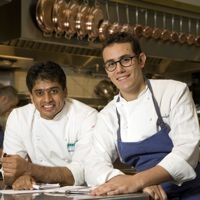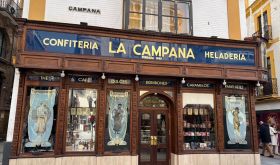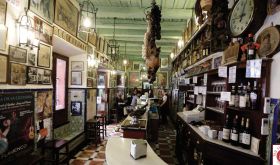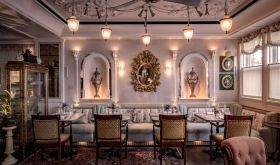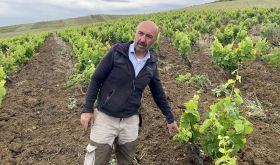Hrishikesh Shridar Desai, known as Richi, is currently cooking at The French Laundry in Yountville, California, America's most prestigious restaurant. Born in Pune, India, he is the first of his family to become a chef and his usual job is in the brasserie at Lucknam Park hotel near Bath, Wiltshire.
He is working in California because on 6 April 6 2009, 'one of the best days of my life', as he described it, Richi beat five other chefs in the UK to win the 2009 Roux Scholarship, the brainchild of Albert and Michel Roux (previous winners include Andrew Fairlie and Sat Bains now in charge of their own restaurants at Gleneagles in Scotland and in Nottingham, respectively). With the title came the prize of a three-month stint working in a three-star Michelin restaurant of his choice anywhere in the world. Richi chose to work here because he had been fascinated by the restaurant's cookbook as a student.
César Troisgros is one of the 20 other chefs in this quietly humming kitchen. Born in Roanne, France, he is the latest scion of this renowned cooking family. His great grandfather and grandfather cooked at the three-Michelin-starred Maison Troisgros now run by his father.
Having watched Desai and Troisgros prepare for that evening's service, I walked with them down Yountville's very wet main street to lunch at Bouchon, the French bistro owned, like The French Laundry, by chef Thomas Keller. What, I wanted to know, had brought them to the same kitchen from such disparate backgrounds?
The answers had to wait as both were obviously hungry. Richi, 30, ordered soupe à l'oignon and gigot d'agneau to remind him of Lyons, where he had studied at the Paul Bocuse Institute for chefs. Troisgros, 24, who had also studied there, chose a goats' cheese salad followed by mussels with frites.
Neither could hide their enthusiasm for their work but it was Troisgros, who has also cooked chez Michel Rostang in Paris and Cellar Can Roca, another three-star Michelin restaurant in Girona, Spain, who put his current experience in context.
'I never believed that the kitchen of a three-star Michelin restaurant could be organised so that it could change its menu every day', he explained. 'That is very, very different from where I've worked in Europe, where the menus in restaurants of similar standing may change only every month or even only every season.'
To achieve this, Richi added, entails two very different aspects of the chef's job that he has never seen elsewhere.
The first is that at the end of each service all the chefs come together to compile the next menu. As the restaurant is open for lunch on Friday, Saturday and Sunday and dinner seven nights a week, this means that around 4 pm and at midnight, once the chefs have cleaned down their stoves, there ensues an animated discussion as to what will next work best. The fish, meat and poultry will have been ordered in advance but the sauces, accompaniments and garnish are all the result of this communal brainstorming.
That this works so successfully in a kitchen serving a minimum of 15 different courses to 70 customers is, Richi continued, down to the second aspect: the most precise and detailed organisation.
'I've never seen anything like it. Everything is written down, templates are drawn up for all the various accompaniments and nothing is left to chance', he enthused. 'Two things really hit me when I started working here. Chefs in any kitchen use plastic containers for their ingredients or to hold the basis of their sauces but invariably the lids go missing and they end up being covered with cling film. Here I've never seen a container without its lid and this is not just so much neater but it also saves a fortune on cling film.
'And this kitchen is so tidy. If you've got a dirty towel on your section, another chef will come along within five minutes and remind you to tidy up. I've developed a lot of good habits while I've been here.'
One small but very practical detail has stuck firmly in his mind. Taped down on the table to which all the chefs deliver their dishes for final inspection before being sent into the restaurant is a copy of that day's menus, the tasting menu and the vegetarian option. Everybody, not just Head Chef Timothy Hollingsworth, can therefore check that the dish matches the description, and meets the definition of finesse (which reads 'refinement and delicacy of performance, execution or artisanship) that is taped in large letters on a piece of paper above the door leading from the kitchen to the restaurant.
For Troisgos the implications of this ever-changing menu are a spur to inspiration that he has never encountered before. 'I've never seen this in Europe, even in my father's kitchen', he explained with a wry smile. 'There the menus are devised exclusively by the chef and his sous chef. Here from my section of the kitchen I get the chance to come up with ideas for three dishes every day and sometimes even more when we know there's a VIP in the restaurant to whose table we are going to serve one or two extra courses.'
As a stagaire, Richi is unpaid (although he receives £75 a week from the Savoy Educational Trust, a culinary education foundation, as part of his prize, while Troisgros is paid $2,000 a month) and does not cook the finished dishes as Troisgros does. But the opportunity to cook 6,000 miles from his usual place of work has opened his eyes in two other, very different respects.
'Firstly, there's been the chance to prepare fish from the Pacific which are so different from what I've cooked with before. And the second is the produce that comes in every morning from the restaurant's five-acre garden just across the road. It's all treated with great respect', he explained, 'and we're told to use it to paint the plates using all of its colours and flavours.'
When he returns to the UK in May, Richi is convinced he will be a chef with much better habits and organisational skills, better able to open the restaurant of his own in London that he dreams of.
For Troisgros, eighteen months at The French Laundry are possibly another stepping stone to taking over from his father one day, although sensibly at his age he will not commit himself. 'The social life in Roanne is much better than in Younvtille but I know for sure that through working here I've learnt to manage myself much, much better. I think I would like to cook in Japan next.'
The French Laundry, www.thefrenchlaundry.com

